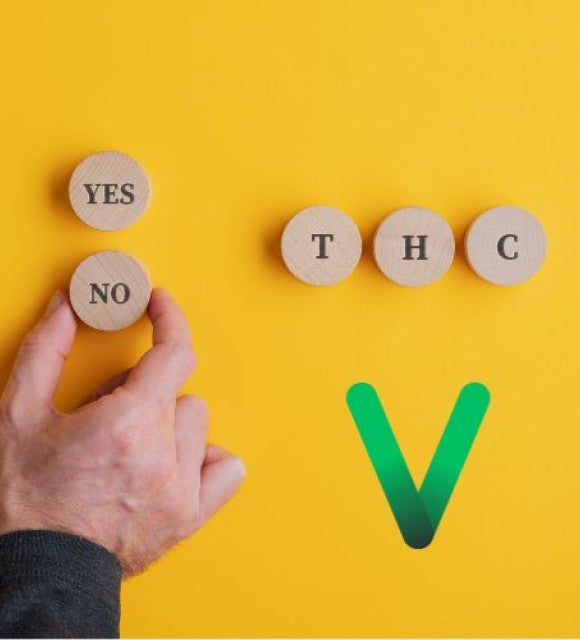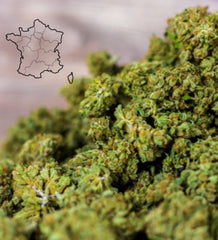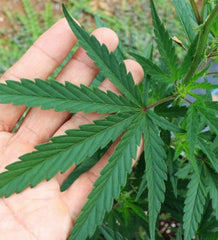
THCV: An enigmatic cannabinoid that divides opinion
What is THCV?
Tetrahydrocannabivarin, or THCV, is a cannabinoid often referred to as "minor," as it is found in very small amounts in the cannabis plant. It is largely dominated by molecules that are both more prevalent in hemp and more widely publicized, such as CBD and THC. Let's analyze this substance from a chemical perspective.
Composition and chemical structure of THCV
Overall, and as its name clearly suggests, the chemical structure of THCV is very close to that of THC, the main (and psychoactive) component of cannabis.
The THCV molecule is composed of 19 carbon atoms, 26 hydrogen atoms and 2 oxygen atoms (C 19 H 26 O 2 ). The main difference with THC lies in the side chain of the molecule. While THC has a pentyl chain (five carbon atoms), THCV has a propyl chain (three carbon atoms), which modifies the properties of the molecule and its interaction with the receptors of our endocannabinoid system. More concretely, the shorter propyl chain of THCV reduces its affinity for the "CB 1" and "CB 2" receptors, which results, for example, in a significantly less marked psychotropic effect as we will see later.
The spatial configuration of THCV
The spatial configuration of the THCV molecule is intrinsically linked to its propyl side chain, which is composed of three carbon atoms, unlike the pentyl chain of THC. This difference in the three-dimensional structure is not insignificant. It will, in fact, decisively influence the way in which the THCV molecule interacts with the "CB 1" and "CB 2" receptors of the endocannabinoid system. Reducing the length of the side chain changes the shape of the molecule, allowing THCV to bind to the receptors without necessarily activating them, especially at low concentrations.
It is this specific arrangement of atoms in three-dimensional space that makes THCV quite different not only from THC but also from other cannabinoids, promising distinct pharmacological properties that have yet to be explored.
How was THCV extracted?
THCV: a little history…
THCV was first identified in the 1970s, but for a long time this discovery remained a mere footnote in cannabinoid research. It was only with the advancement of cultivation and extraction techniques that THCV research resumed, driven by several factors:
- The desire to go even further in the management of chronic and/or stubborn pain that resists available pharmaceutical treatments;
- The need to find alternatives to existing painkillers such as opioids, which, let us remember, are responsible for several hundred deaths each year due to self-medication, not to mention the pronounced addictive effect;
- The promising results of scientific studies on the value of hemp in the treatment of patients suffering from neurodegenerative diseases, including Parkinson's, Alzheimer's and multiple sclerosis.
THCV was originally identified in certain cannabis strains from Africa and Asia, where levels of the molecule were slightly higher than in other varieties found in South America or Europe. The five decades that elapsed between the molecule's discovery and its actual chemical isolation can be explained by two factors: the complexity of its extraction and its very low levels in the hemp plant.
THCV extraction: using cutting-edge methods
Rapid advances in extraction techniques enabled researchers to isolate THCV in the late 2010s using cutting-edge techniques, including liquid chromatography and supercritical CO2 extraction. This approach also led to the isolation of other cannabinoids such as THCP and HHCP.
Liquid chromatography is the least expensive method for extracting THCV. This technique uses a solvent and a chromatography column to separate the different cannabinoids. To isolate THCV specifically, a reverse-phase packed column, such as a C18 column, is preferred. The solvent is generally a mixture of water, methanol, and acetonitrile in varying proportions. The pH and composition of the solvent will likely need to be adjusted to favor THCV elution.
Supercritical CO2 extraction is a premium method that results in a purer THCV molecule. Supercritical CO2 is a state of matter where CO2 is maintained at a pressure and temperature beyond its critical point, giving it both liquid and gaseous properties. As a result, supercritical CO2 diffuses through solids like a gas while dissolving compounds like a liquid.
In the extraction process, supercritical CO2 passes through the plant material, dissolving the cannabinoids, including THCV. The specific separation of THCV is then carried out using a reverse-phase packed column (C18 column), which allows for efficient separation of THCV from other cannabinoids.
This technique has definite advantages, such as cleaner separation and reduced margin of error, but it requires specialized equipment and advanced technical expertise.
How does THCV interact with our body?
THCV is a bit of a chameleon in the cannabinoid world. At high doses, it behaves similarly to THC, acting as an agonist of the "CB1" receptors found primarily in the brain, producing psychotropic or "intoxicating" effects, although they are less pronounced than with THC.
When consumed in low doses, THCV changes color, so to speak. It then becomes an antagonist of the same "CB 1" receptors, attenuating the psychotropic effect (without completely eliminating it).
These opposing "behaviors" of THCV are explained by the biphasic effect of cannabinoids. It's as if these compounds have a dual personality, capable of causing completely opposite effects depending on the dose consumed, the receptivity of the endocannabinoid system, genetics, etc.
Does THCV (really) have a therapeutic interest?
The chemical structure of THCV, both familiar (proximity to THC) and different (particularly the side chain), makes it an exciting research subject for scientific teams wishing to explore new avenues.
THCV, although present in low concentrations in the cannabis plant, has already shown promising results in applications such as regulating metabolism, controlling appetite, and treating certain neurological disorders. The complexity of its extraction, combined with the constant evolution of cutting-edge techniques, suggests, however, that research will only advance if it is taken over by large pharmaceutical groups.
Therapeutic interest no. 1: THCV, an appetite suppressant?
The interest in THCV as an appetite suppressant stands out clearly in cannabinoid research given the size of the market for weight loss and obesity treatment products, particularly in the United States and some European countries. Unlike THC, which can stimulate appetite, THCV appears to have the opposite effect, reducing the feeling of hunger. As explained above, at low concentrations, THCV acts as an antagonist of the CB 1 receptor, thus blocking the appetite-stimulating effect associated with the activation of this receptor.
This role as an appetite suppressant makes THCV an attractive therapeutic target for the development of treatments for obesity and associated eating disorders. Furthermore, its action on the CB1 receptor could have beneficial effects on blood sugar regulation and lipid metabolism, thus offering a multifaceted approach to weight management.
Research into the use of THCV as an appetite suppressant is still in its early stages, and further studies are needed to fully understand its mechanism of action and potential therapeutic applications.
Therapeutic interest no. 2: the treatment of schizophrenia
Perhaps the second most important therapeutic interest of THCV is its potential in treating schizophrenia spectrum disorders. Research in this area is relatively new, but it has already revealed encouraging results on how THCV modulates and alleviates certain symptoms of schizophrenia.
It should be remembered that schizophrenia is a complex mental disorder characterized by severe symptoms such as hallucinations, delusions, disorganized speech, and cognitive dysfunction of varying degrees. Treating these symptoms represents a major challenge for modern psychiatry.
THCV's dual agonist-antagonist role (depending on concentration) makes it a substance of interest for modulating neurotransmitters and influencing neuronal behavior. Preliminary studies suggest that THCV may effectively reduce dopaminergic hyperactivity, often associated with schizophrenia. As a CB 1 receptor antagonist, it may contribute to the release of dopamine, thereby reducing psychotic symptoms.
Concretely, THCV could provide a new therapeutic avenue for managing the symptoms of schizophrenia without the side effects traditionally associated with currently available antipsychotic drugs. Finally, the anti-inflammatory properties of THCV could help alleviate neuroinflammation, a factor that exacerbates schizophrenia.
Therapeutic interest no. 3: THCV and type 2 diabetes
This chronic metabolic disease, characterized by hyperglycemia due to insulin resistance and the inability of the pancreas to produce enough insulin, affects millions of people worldwide.
THCV has shown promise in regulating blood sugar and improving insulin sensitivity. In animal studies, researchers have observed that THCV can reduce insulin resistance and promote improved glucose tolerance under certain conditions. Interestingly , THCV appears to influence the β cells of the pancreas, which are responsible for insulin secretion. Dysfunctions in these cells are often the cause of type 2 diabetes. Today, the hypothesis that THCV can stimulate β cells, improve insulin secretion, and help regulate blood sugar levels is credible.
Additionally, as a CB 1 receptor antagonist, THCV may have an effect on appetite reduction and weight management, a factor often linked to type 2 diabetes.
The potential for using THCV in the treatment of type 2 diabetes therefore offers an innovative therapeutic avenue that could complement existing treatments. However, as with other therapeutic applications, research on THCV in the context of diabetes is in its early stages. The potential is there, but the path to clinical application still requires rigorous and methodical scientific exploration that will likely take at least a decade, if not longer.
Therapeutic interest no. 4: THCV and neurodegenerative disorders
Parkinson's disease is a progressive neurodegenerative disorder that affects the central nervous system, with typical symptoms including tremors, rigidity, and general movement difficulties. Research on THCV has highlighted its neuroprotective and anti-inflammatory properties, which may be beneficial in the treatment of Parkinson's disease. In fact, THCV appears to act on the CB2 receptors of the endocannabinoid system to reduce inflammation in the brain. This anti-inflammatory action appears to be coupled with an ability to protect dopaminergic neurons, the loss of which is associated with the progression of Parkinson's disease.
THCV also shows promise in the management and treatment of Alzheimer's disease, which is characterized by progressive memory loss and cognitive decline. THCV may play a role in reducing inflammation and oxidation in the brain, two factors that contribute to the progression of Alzheimer's disease. It may also help modulate the production and aggregation of beta-amyloid proteins, which are associated with the plaques characteristic of this neurodegenerative disease.
Here again, it should be remembered that research on the therapeutic interest of THCV in the treatment of neurodegenerative pathologies is only in its infancy. In France, the Ministry of Health is expected to publish the results of its large clinical experiment on the effectiveness of cannabinoids, particularly CBD and THC, in the treatment of several diseases and disorders, during the second half of 2024. To be as complete as possible, let us recall that the French National Agency for the Safety of Medicines (ANSM) had selected the following applications for CBD and THC as part of this experiment:
- Refractory neuropathic pain, which resists available analgesic treatments;
- Painful spasticity in multiple sclerosis (MS) and other central nervous system (CNS) pathologies;
- So-called “pharmaco-resistant” epilepsies;
- Recalcitrant pain associated with certain forms of cancer and other chronic pathologies;
- In a palliative care situation.
Please note: The four therapeutic benefits we have presented are part of scientific research and are used in a context where THCV is used as an active ingredient in medication. THCV found over the counter in stores is not intended to treat any medical condition. In fact, the THCV you can consume in flowers, oils, or any other legal hemp product is a dietary supplement with relaxing, analgesic, and anti-inflammatory properties, like CBD, CBG, CBC, and CBN, but with a psychotropic effect.
Is THCV legal in France?
Short answer : yes, THCV is legal and freely available in France, unlike THC, which is similar to it. But make no mistake: THCV is in a legal gray area, like other recently discovered cannabinoids such as H4CBD and THCP. Its legal status could change at any time, as was the case for HHC in June 2023, which was banned in France (along with its derivatives). The least we can say is that THCV is on an ejection seat.
But France isn't alone in its hesitation over THCV's legal status. In the United States, the molecule isn't on the list of controlled substances, but the FDA has yet to give the green light for its medical use.
In Canada, THCV is welcomed with open arms, provided it is purchased from authorized sources. In Europe, legislation is not yet aligned between different countries, as some countries approve the use of medical cannabis (and therefore indirectly the use of THCV), while others prohibit it outside of any state-sponsored experimentation (as in France).
Today, THCV is found primarily in full-spectrum hemp products, including hemp flowers, resins, concentrates, and CBD oil.
Why doesn't Famous CBD offer THCV products?
At Famous CBD, we're not just a supplier of cannabidiol and legal hemp products. We strive to become your partner in daily quality of life, with high-quality, traceable, and safe products.
We are also here to decipher the latest news on cannabinoids, where the very good (CBD, CBC, CBN, CBG) can sometimes rub shoulders with the less good (THCV) or the dangerous (THC, HHC, etc.). The approach we are developing to choose the products to include in our offer is simple: no psychoactive product will have a place in our catalogs, even when the intoxicating effect is "light". It is for these reasons that we do not offer hemp products concentrated in THCV, even if the law allows us to do so for the moment.
We make it a point of honor to follow best practices, to inform you through rigorous content, designed by experts in the field of cannabinoids and the endocannabinoid system, and above all to provide you with hemp products of impeccable quality. Trusting Famous CBD is the assurance of treating your body and mind to the best hemp products with complete peace of mind... and at the best price!





